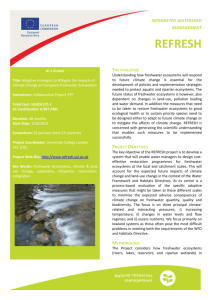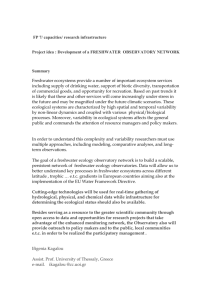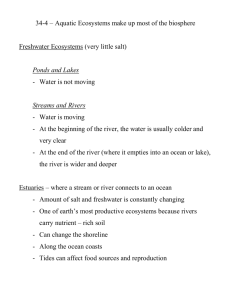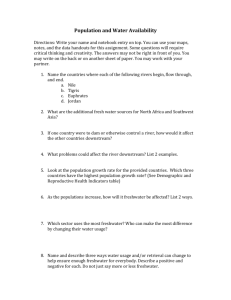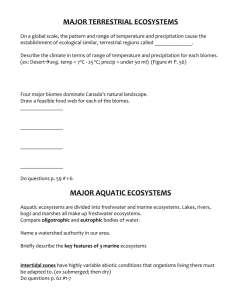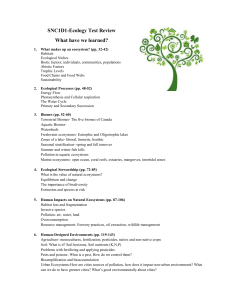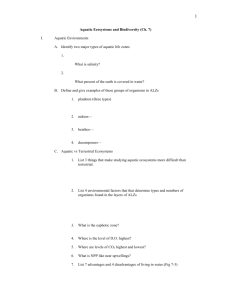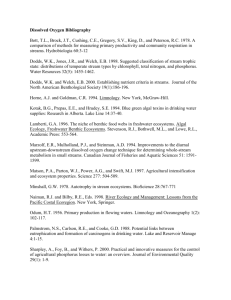d-2-2011-11-25-REFRESH_Flier - wise
advertisement
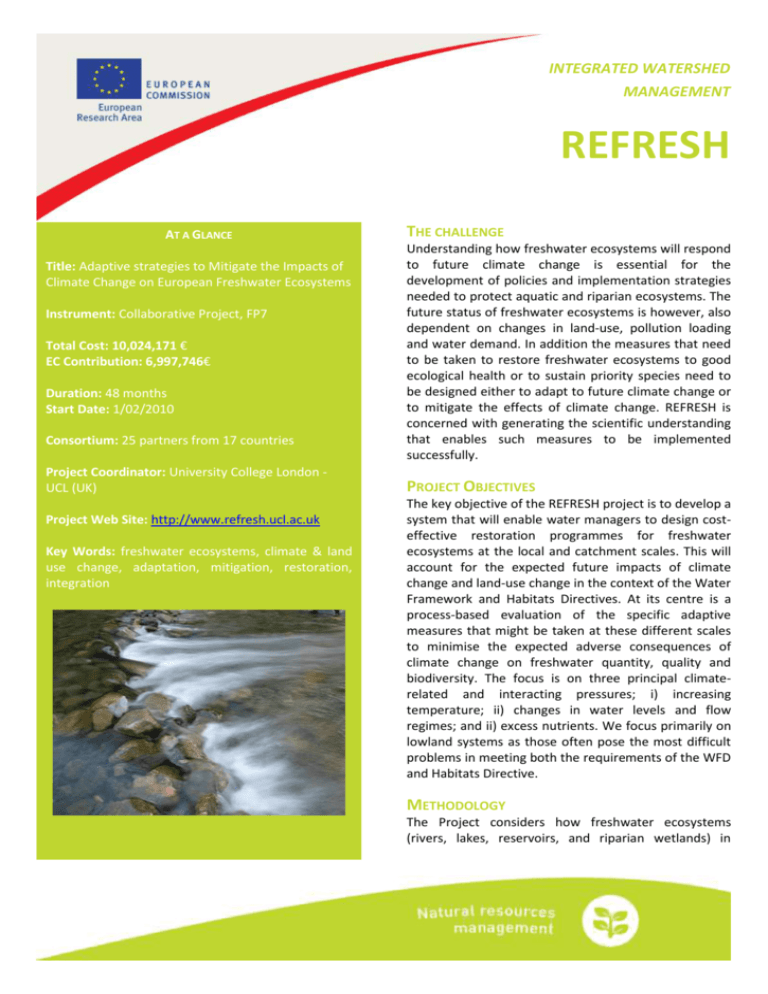
INTEGRATED WATERSHED MANAGEMENT REFRESH AT A GLANCE Title: Adaptive strategies to Mitigate the Impacts of Climate Change on European Freshwater Ecosystems Instrument: Collaborative Project, FP7 Total Cost: 10,024,171 € EC Contribution: 6,997,746€ Duration: 48 months Start Date: 1/02/2010 Consortium: 25 partners from 17 countries Project Coordinator: University College London UCL (UK) Project Web Site: http://www.refresh.ucl.ac.uk Key Words: freshwater ecosystems, climate & land use change, adaptation, mitigation, restoration, integration THE CHALLENGE Understanding how freshwater ecosystems will respond to future climate change is essential for the development of policies and implementation strategies needed to protect aquatic and riparian ecosystems. The future status of freshwater ecosystems is however, also dependent on changes in land-use, pollution loading and water demand. In addition the measures that need to be taken to restore freshwater ecosystems to good ecological health or to sustain priority species need to be designed either to adapt to future climate change or to mitigate the effects of climate change. REFRESH is concerned with generating the scientific understanding that enables such measures to be implemented successfully. PROJECT OBJECTIVES The key objective of the REFRESH project is to develop a system that will enable water managers to design costeffective restoration programmes for freshwater ecosystems at the local and catchment scales. This will account for the expected future impacts of climate change and land-use change in the context of the Water Framework and Habitats Directives. At its centre is a process-based evaluation of the specific adaptive measures that might be taken at these different scales to minimise the expected adverse consequences of climate change on freshwater quantity, quality and biodiversity. The focus is on three principal climaterelated and interacting pressures; i) increasing temperature; ii) changes in water levels and flow regimes; and ii) excess nutrients. We focus primarily on lowland systems as those often pose the most difficult problems in meeting both the requirements of the WFD and Habitats Directive. METHODOLOGY The Project considers how freshwater ecosystems (rivers, lakes, reservoirs, and riparian wetlands) in Europe will change over the next fifty years and it uses a combination of novel experiments and modelling to generate the understanding and tools needed to implement an adaptive management strategy. We will use a series of carefully designed, co-ordinated field experiments in which river, lake and wetland sites have been selected to represent a gradient of climate conditions across Europe. These will be supported by laboratory and mesocosm experiments, analysis of major databases that enable time-space modelling, further analysis of long-term time-series assembled during the Euro-limpacs project and by evidence from palaeoecological studies where extreme events and abrupt transitions in the past have been recorded. All these approaches will be combined to help develop the process-based models needed to run scenarios for adaptive strategies and which are required for upscaling from local to river basin. EXPECTED RESULTS REFRESH will provide an improved prediction capacity of the hydrological and hydrochemical response of surface waters to land-use/management and climate change and the subsequent changes in aquatic ecological interaction. REFRESH will have a major impact on restoration planning by showing how scenarios for changes in future climate, land-use, nitrogen deposition and water resources can be combined and down-scaled to the catchment level. It will provide an understanding of how key adaptive strategies for managing temperature, hydrology and nutrient changes in catchments will impact on water quantity and quality and on the ecological structure, functioning and biodiversity of surface waters. Key outputs will include the development of a set of principles and guidelines that will allow managers to assess vulnerability to climate change, a new system of indicators that will enable changes in freshwaters affected by climate change to be monitored effectively and a catchment modelling framework that will allow decision makers and managers to generate forecasts under different scenarios that incorporate alternative adaptive measures and enable optimum choices to be made that also acknowledge uncertainty and risk. A methodology will be provided that will allow the costeffectiveness of alternative adaptive strategies to be modelled and evaluated. A detailed guide to the successful implementation of measures at a catchment scale will be provided that recognises socio-economic barriers as well as ecological challenges. REFRESH will show how an integrated approach to water-body assessment and management can be developed for any European catchment using a series of catchments representative of the main climate regions in Europe. Ultimately RESFRESH will provide a comprehensive overview of adaptive management principles and measures required to modify key directives and advise national governments and environment agencies. PROJECT PARTNERS University College London, UK Institut National de la Recherche Scientifique, (Canada) CA Aarhus Universitet- National Environmental Research Institute, DK Commission of the European Communities - Directorate General Joint Research Centre, EU The University of Reading, UK Stichting Deltares, NL Finnish Environment Institute, FI Universitaet fuer Bodenkultur Wien, AT Universitaet Duisburg-Essen, DE Biology Centre AS CR, v.v.i., Institute of Hydrobiology, CZ Alterra B.V.. NL Eesti Maaülikool (Estonian University of Life Sciences), EE Natural Environment Research Council, UK Universitat de Barcelona, ES Swedish University of Agricultural Sciences, SE University of Patras, GR Macaulay Land Use Research Institute, UK Centre National de la Recherche Scientifique - UNIVERSITE PAUL SABATIER, FR Utrecht University, NL Norwegian Institute for Agricultural and Environmental Research, NO Consejo Superior de Investigaciones Científicas, ES Norwegian Institute for Water Research, NO Middle East Technical University, TR Trent University, CA Forschungsverbund Berlin e. V, DE Australian Rivers Institute (ARI), Griffith University, AU
